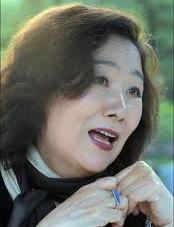
- Now Following the Rose
- Published by: N/A
- Level: Intermediate
- First Published in: 2001
An anthology of Jung-hee Moon’s poetry, which includes one of her best pieces, "Where Did All the Schoolgirls Go?"

In the Jung-hee Moon’s poetry anthology 지금 장미를 따라 (Now Following the Rose), one of the best poems is titled, “그 많던 여학생들은 어디로 갔는가” (Where Did All the Schoolgirls Go?), a feminist piece that uses rhetorical questions and alternating voices to criticize women who succumb to patriarchal society.
The poem is split into three stanzas. The first stanza describes a smart schoolgirl who exceled in her classes and glided into a top university; the poet wonders what has happened to her since. In the second stanza, the poet offers an array of possible scenarios: the girl might have become a stay-at-home wife, cooking “감자국” (“Gamja-gook” or “potato soup”) for her husband, and helping out her children with homework; she could also be trying to get a job or might already be employed; she might be helping out with elections and ceremonies, or working as a business executive’s secretary; she could even be the lucky wife of a doctor or lawyer, or possibly be taking singing lessons, hurrying home before her husband got there. The third stanza asks, rhetorically, “Where did all those smart schoolgirls go?” The question answers itself: They are never politicians, doctors, or lawyers themselves.
"The poem 'Where Did All the Schoolgirls Go?' is a feminist piece that uses rhetorical questions and alternating voices to criticize women who succumb to patriarchal society."
Throughout, Jung-hee Moon asks questions about the schoolgirl or about a classmate from ages ago, whom she never hears from. Then, the poet extrapolates, in a worried tone, that the schoolgirl might be having a hard time, trying to break through the glass ceiling this patriarchal society has placed over women. But, in the end, the poet assumes the former schoolgirl is fine, expressing this sentiment by ending sentences with, “겠지,” a phrase used when correcting someone or assuming something. The schoolgirl, probably, “다행히” (“dahaeng-hee” or “thankfully”) got a job as a secretary and serves tea to her boss or her husband. When the poet asks, for the last time, “Where did all the schoolgirls go?,” the reader realizes that these grown-up secretaries and wives are not the same people as the smart, driven schoolgirls they used to be (which might recall the plot of American cult film The Stepford Wives)
"What is interesting about this poem is that it presents both sides of the 'women need to act' argument, rather than blindly calling women to action."
The aforementioned “potato soup” anecdote is especially effective at conveying this message. The poet is not criticizing the husband, who feasts on the soup with gusto, but rather aiming at the woman, who slaves over a boiling pot for “세시간” (3 hours) just to watch her husband finish his bowl in “15 분” (15 minutes). As an alternative to this fate, the poet describes a different scenario in which the grown-up schoolgirl “개밥의 도토리처럼 이리저리 밀쳐져서 아직도 생것으로 굴러다니다” (Wanders like an acorn in dog food, pushed and shoved here and there). This is what would have happened to the potato-soup lady had she tried to break through the glass ceiling. The poet is ambivalent about calling women to action and spurring them to stand up for themselves. She criticizes women who have turned into “Stepford wives,” but takes pity on those who tried to stand on their own two feet and have inevitably failed. This is an issue that has popped up in almost every single culture. What is interesting about this poem is that it presents both sides of the “women need to act” argument, rather than blindly calling women to action. Surprisingly, this poem was first published in 2001.
